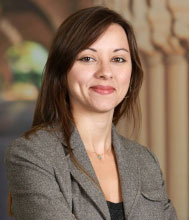
Barbara Born, PhD candidate, Stanford GSE
Becoming a Professional Development Facilitator: Understanding the knowledge and practices of district-based PD facilitators
The capacity of the facilitator to mediate the relationship between the group of teachers and a professional development (PD) program and content affects the learning opportunities that arise for teachers in any professional learning experience (Jackson, Cobb, Wilson, Webster, Dunlap, & Appelgate, 2015.) Despite the centrality of facilitators to the success of professional development opportunities, however, little is known about who they are, how they became facilitators, how they built their knowledge about educating adults in professional contexts, or of which practices they enact and the rationale behind it. This lack of information is particularly true when it comes to mapping knowledge about district-based or local professional development facilitators (PDFs) (Borko et al., 2017; Borko, Koellner, & Jacobs, 2011; Heather C. Hill, 2009). Understanding their background and practices seems to be an important piece to rethink strategies for delivering professional development relying on local staff. This study addresses these aspects, investigating the knowledge, practices and perspectives about teacher learning that district-based facilitators possess.
This research focuses on district-based facilitators, drawing on the assumption that the lack of information about them can undermine the intends of successful professional development. Improving the knowledge about local facilitators practices and knowledge, as well as how they build them, can support further interventions aiming to professionally develop PDFs. To support these facilitators that are in direct contact with most teachers, it is crucial to learn more about their previous knowledge, the practices they already employ and how they perceive PD changing teachers’ practices. Research suggests that learners in general, and adults in particular, have their own systems of explanations about phenomena that surround them, and to understand such previous knowledge and engage with it is fundamental if we want to propose new approaches (Bransford, Brown, & Cocking, 2000; Drago-Serverson, 2009). Hence, to advance the knowledge about how to prepare and support proficient facilitators, the first step is to investigate what they know and what they already do in their workshops with teachers.



